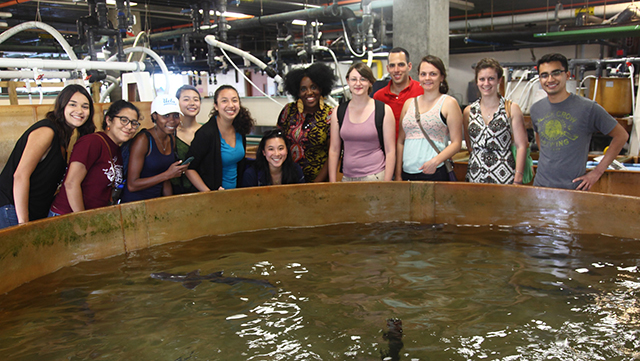What is a “Discovery Course?” HHMI Program Alumni Find Out

After spending two days and evenings observing the MBL Physiology class in action, Juan Pablo Ruiz texted to his mother, “This is the way science should be -- curiosity, freedom, and intensity.”
Ruiz was visiting the MBL with 11 other alumni of the Exceptional Research Opportunities Program (EXROP), an initiative of the Howard Hughes Medical Institute (HHMI). The program places selected undergraduates from disadvantaged backgrounds or groups underrepresented in the sciences in the labs of HHMI scientists for a summer research experience. All the alumni who visited MBL are now doctoral students, including Ruiz, a D.Phil. candidate at the National Institutes of Health (NIH)/University of Oxford.
Ruiz is now excited to apply to attend an MBL summer or “discovery” course next year, either Physiology (“I’ve heard rave reviews about that course both at HHMI and at the NIH,” he said) or Embryology. An engineer by training, Ruiz wants to explore the engineering of stem cells, the progenitors of function-specific body cells.
 Alumni of the EXROP program visit the Marine Resources Center. L-R: Krissy Lyon, Karina Perlaza, Taylor Brown, Christine Liu, Elelbin Ortiz, Vivian Chen, Daisha Steadman, Rebecca Senft, Juan Pablo Ruiz, Kendall Condon, Maureen Carey, Javier How. Credit: Steve Zottoli
Alumni of the EXROP program visit the Marine Resources Center. L-R: Krissy Lyon, Karina Perlaza, Taylor Brown, Christine Liu, Elelbin Ortiz, Vivian Chen, Daisha Steadman, Rebecca Senft, Juan Pablo Ruiz, Kendall Condon, Maureen Carey, Javier How. Credit: Steve Zottoli“Now that I see how complex a stem cell can be, I have become interested in developmental biology at the molecular level, where there are important cell signaling behaviors [as the organism develops]” he said. “Until we understand those, there is no way to engineer stem cells. So I want to take a step back from engineering to basic biology, to better understand what is happening.”
Ruiz and the other EXROP alumni each chose one MBL summer course to attend, with an MBL student as their host. They got the full course experience, starting with a morning lecture and continuing with afternoon and evening lab work pursuing curiosity-driven, boundary-pushing research.
“There is an immersion in science here. One student said time does not exist: he is in the lab at all hours,” said EXROP alumna Maureen Carey, a graduate student at University of Virginia.
“People are like, ‘We want to be like kids again! We want to try things we can’t do in a regular lab setting,’” Ruiz said.
Carey spent her time in the MBL Parasitology course. Her graduate work is focused on the metabolic perturbations induced by drug resistance in Plasmodium falciparium, the parasite that causes malaria. “So little of the Plasmodium genome is annotated. I want to study other pathogenic parasites that are better understood, to see if any of those tools or knowledge can be transferred,” she said. She’s not yet sure if she wants to focus on computational modeling or a wet lab approach to her graduate work, but if the latter, she may apply for the MBL Parasitology course next year.
“We were delighted to host the EXROP alumni here again this year,” said MBL President and Director Huntington Willard. “They are incredibly promising students, and MBL courses can be a great fit for them as they advance their careers. We share HHMI’s commitment to opening doors to discovery for students who might not otherwise get that opportunity. It’s wonderful to have them visit our courses and to get a sense of what learning the MBL way can be like.”
The graduate students and the courses they visited are:
Taylor Brown, University of California, Los Angeles (Biology of Parasitism)
Maureen Carey, University of Virginia (Biology of Parasitism)
Karina Perlaza, University of California, San Francisco (Microbial Diversity)
Daisha Steadman, Georgia State University (Microbial Diversity)
Javier How, University of California, San Diego (Neural Systems & Behavior)
Elelbin Ortiz, University of Pennsylvania (Neural Systems & Behavior)
Rebecca Senft, Harvard University (Neural Systems & Behavior)
Christine Liu, University of California, Berkeley (Neurobiology)
Krissy Lyon, Harvard University (Neurobiology)
Vivian Chen, Stanford University (Physiology)
Kendall Condon, MIT (Physiology)
Juan Pablo Ruiz, National Institutes of Health/University of Oxford (Physiology)